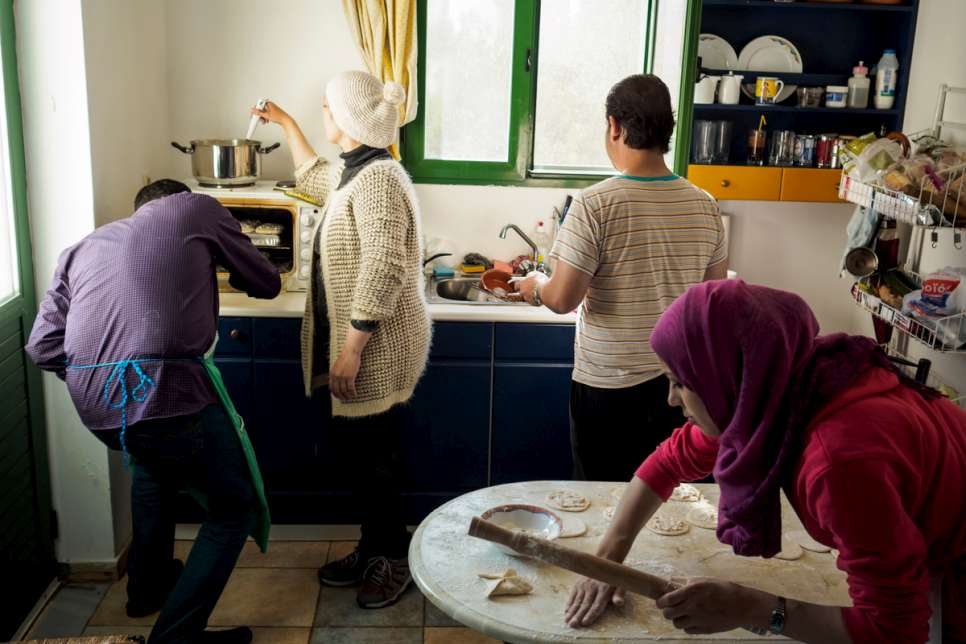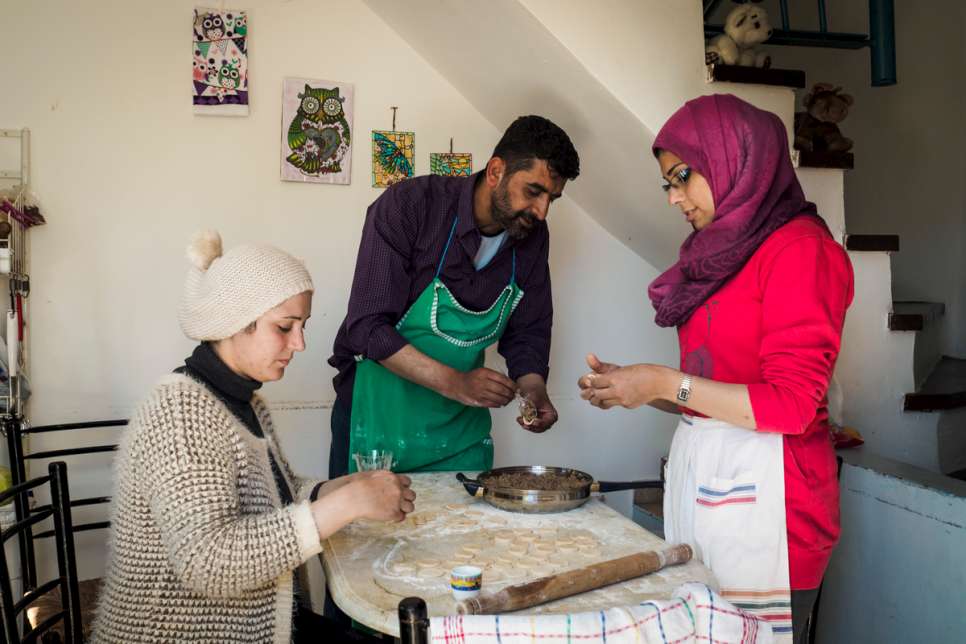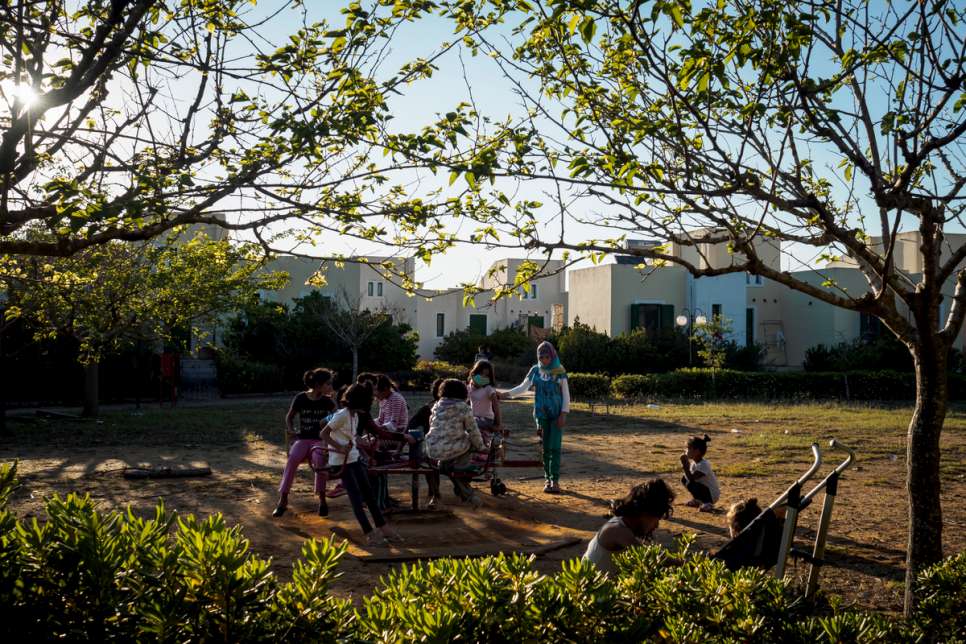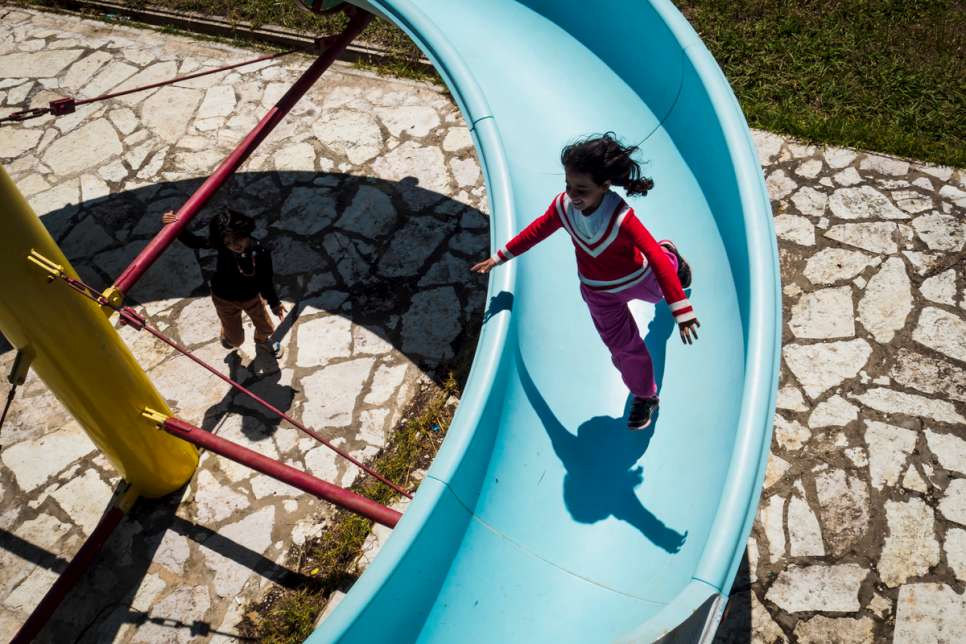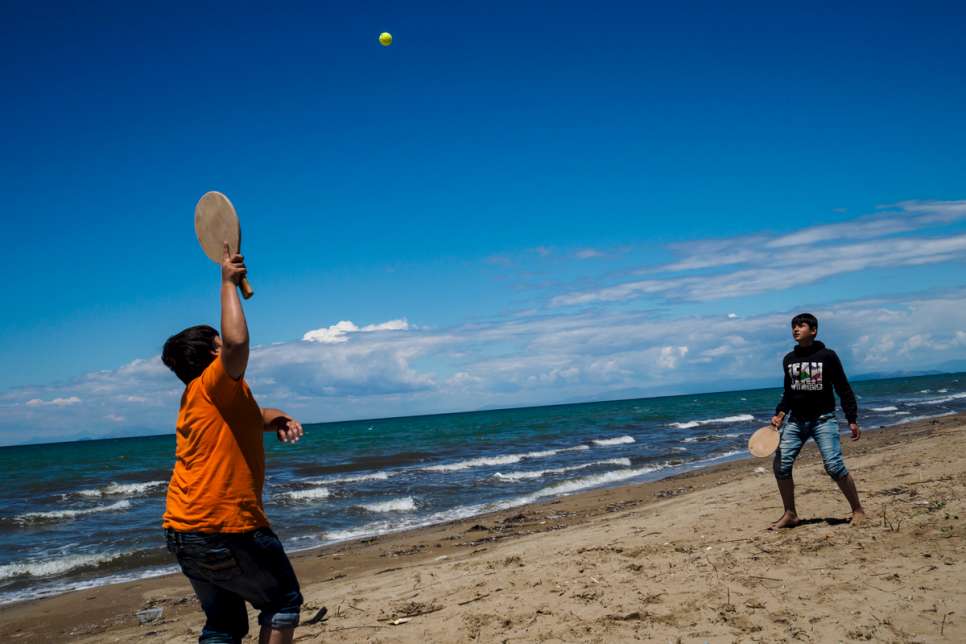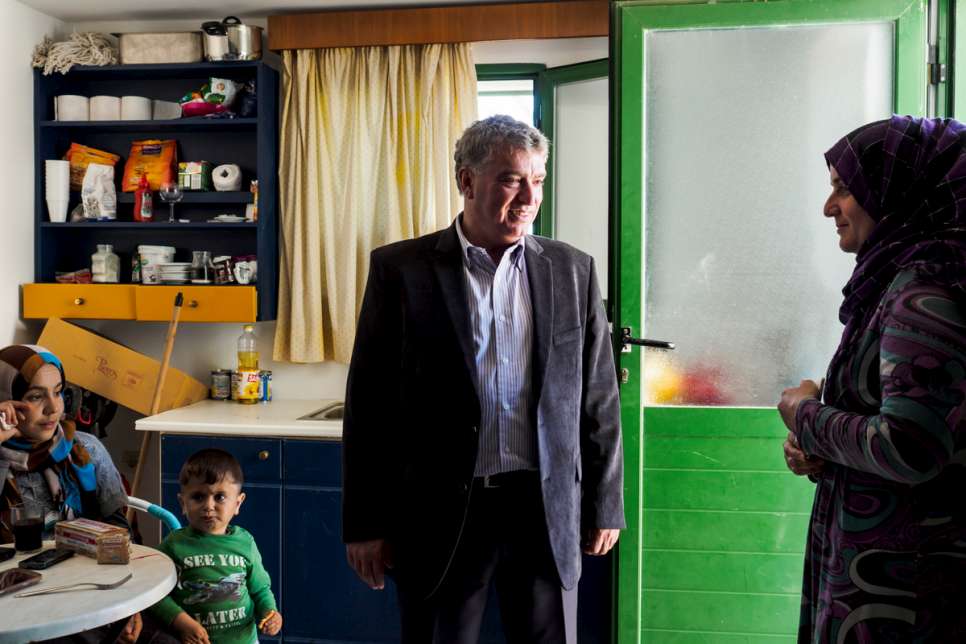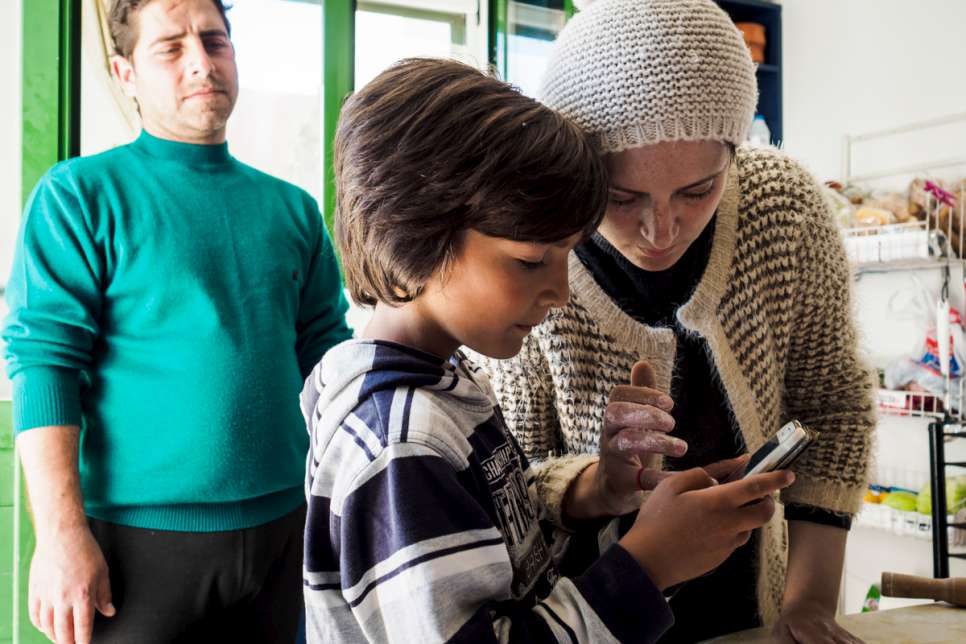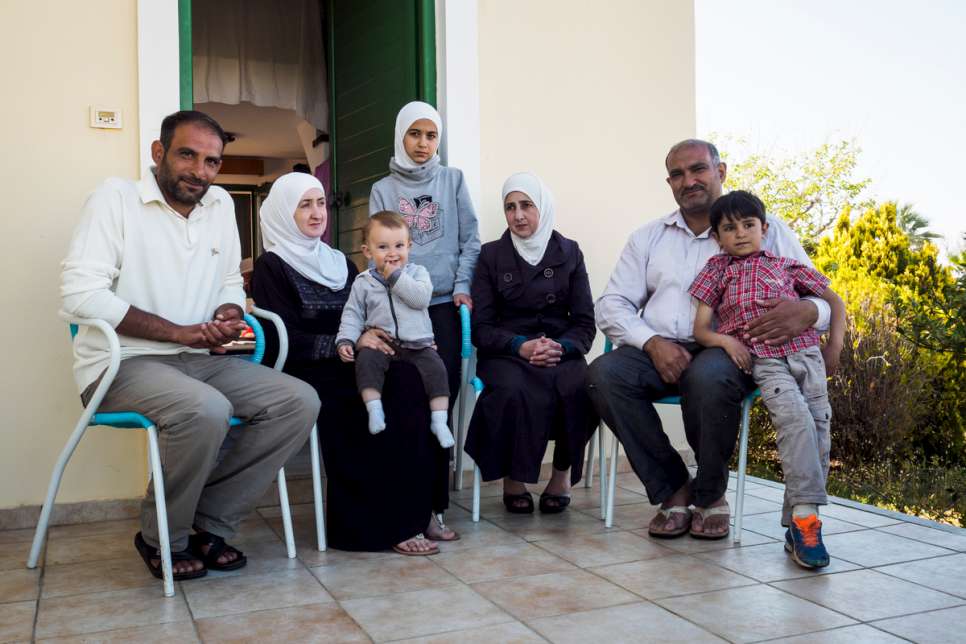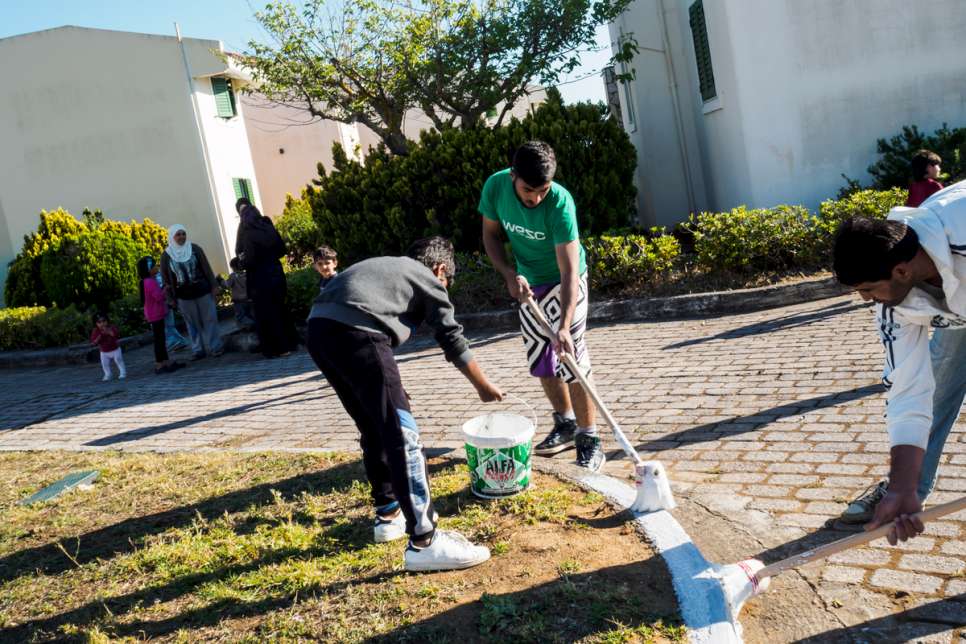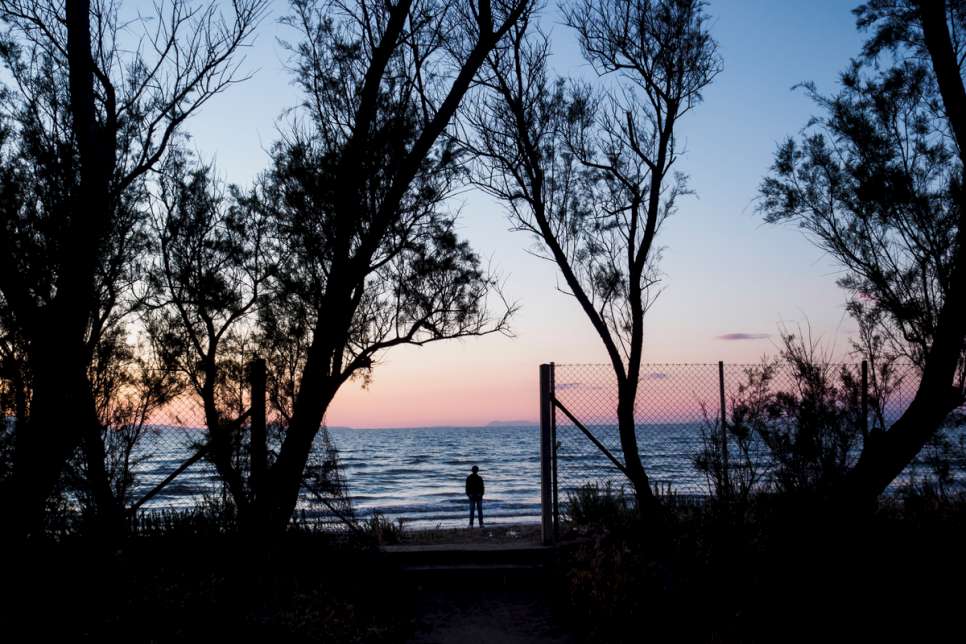Greek Syrian mayor and refugees bring tourist village back to life
A Greek summer resort that closed over five years ago as a result of the financial crisis has been turned into a haven for more than 300 refugees.

LM Village in Greece is home to 300 Syrian and Iraqi refugees waiting for their relocation-scheme applications to be processed. © UNHCR/Achilleas Zavallis
In a two-storey, white-painted apartment beside a picturesque beach, Tarek Al-Felou and his wife, Kinda, are making a shish barak, a Middle Eastern dish of meat dumplings.
Their neighbours are some 320 refugees, most from Syria. Since late March, they have breathed new life into LM Village, a summer resort that closed more than five years ago as a result of Greece's financial crisis.
Now, each of the 38 neatly painted bungalows houses two families. Their laundry flutters in the breeze. Mothers chat on porches framed by palm trees. Teenagers play basketball on an abandoned court as toddlers chase each other up and down a faded, blue-and-yellow water slide nearby. "Yallah, get down from there!" shouts an older boy. Five times a day, a grandfather's Islamic call to prayer echoes through the square.
The resort-turned-refugee-shelter is a village in nearly every sense, a far cry from the fighting, shelling and sieges its residents escaped just months ago. For most, it is the closest approximation to their former, pre-war lives that they have experienced in years.
"In this place we try to forget we are refugees," says Tarek, 42, who once owned a restaurant outside Damascus and fled to Greece with Kinda and their two children. "We can pretend we're on holiday."
The reopening of the resort as a refugee reception centre is the initiative of the local mayor, Nabil-Iosif Morad, a Syrian doctor from Homs who has lived in Greece for 25 years. A Greek citizen through marriage, Nabil-Iosif is also the first naturalized Greek of Syrian origin elected to office in the country.
He offered the resort after the Greek Government asked local mayors for help in taking in the 57,460 refugees still in Greece, following border closures along what is known as the 'Balkan route' to northern Europe. More than 1 million refugees and migrants arrived in Europe last year by sea, according to UNHCR figures.
Nabil-Iosif says at first he started gathering donations of clothing to send to Idomeni, the unofficial camp at the Greek border with the former Yugoslav Republic of Macedonia, where 10,000 refugees lived in squalor for several months this spring. "But that wasn't enough. So I asked whether we could use this space."
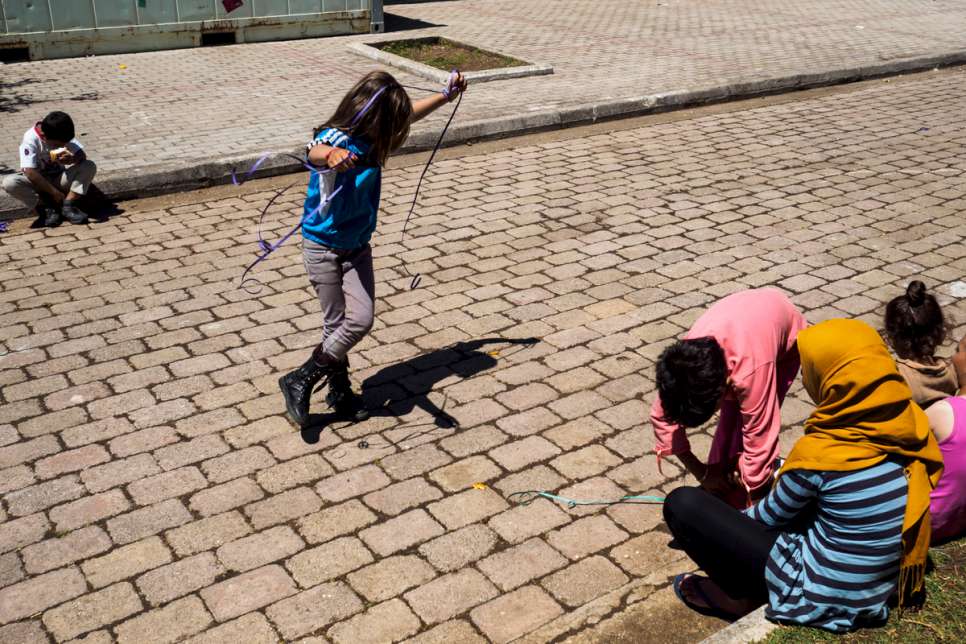
Nabil-Iosif Morad: "We agreed to bring them here so they can spend their remaining time in Greece in good hands."
LM Village is located 70 kilometres from Greece's third-largest city, Patras. Nabil-Iosif says that although some residents were hesitant about using the resort as a refugee shelter, the local council approved the idea almost unanimously.
The Greek Defence Ministry, which oversees some aspects of migration management in cooperation with the Minister for Migration Policy, renovated dilapidated buildings and restored electricity and drinking water supplies.
Within days, half a dozen buses brought in refugees who had been living for weeks in an informal camp at the Athens port of Piraeus. All are young families, some with grandparents in tow. Several are women travelling alone with their children.
The resort's youngest residents are days old: two babies have been born at a local hospital in the past two months.
Nabil-Iosif is bombarded with questions whenever he visits. The three volunteer supervisors do not speak Arabic and few of the refugees speak English.
“We have to first stop the war in Syria."
Recently, Nabil-Iosif heard complaints about dirt in the water supply and read a woman the results of medical tests that were written in Greek.
However, such problems were manageable, he says.
"It makes me happy to see them living like this after they've left from bombs and war," says Nabil-Iosif, whose three siblings fled Homs to areas along Syria's west coast. "But in order to stop these images we see from Idomeni and elsewhere in Europe, we have to first stop the war in Syria."
Lawyers from the Patras bar association have visited LM Village to give free legal consultations. Many refugees await interviews with the Greek Asylum Service so they can apply for relocation, a European Union program that aims to move 160,000 asylum-seekers from Greece and Italy to other Member States in the coming years. More than a dozen have already left LM Village for Portugal. More will be relocated in the months after 'pre-registration,' a new, nationwide joint effort by UNHCR and Greek Asylum Service to identify legal solutions for each individual asylum-seeker.
LM Village receives help from local Red Cross volunteers, who distribute donated food and have organized a library and school with English and Greek lessons taught by both refugees and volunteers. UNHCR is now establishing a prayer space and food distribution system for the holy month of Ramadan.
Despite the good living conditions, however, the sense of temporariness is hard on those anxious to reunite with family members elsewhere in Europe.
LM Village resident Fares Al-Hamdan has not seen his eldest two sons, 18-year-old Baraa and 16-year-old Muhammad, in more than six months. They live in separate refugee shelters in Germany. The 47-year-old father and former schoolteacher sent them to Europe six months ago after armed men in Syria threatened to arrest Baraa. The boy had already served three months in a government prison, where he was tortured despite committing no crime, Fares says.
As well as worrying about his sons, Fares also despairs at not being able to support his elderly mother, his wife Hanadi, and their four other children: Rama, 15, Heba, 14, Sedra, 7, and Ahmad, 5.
"When I have to take help from others, my heart is broken," Fares explains, as Sedra climbs into his lap and hugs him. "When a man has a family, he wants to provide for them with money he earns with his own hands. Here, I cannot work. Here, we are only waiting. Waiting for the last stage of our journey. Waiting to be reunited with our sons. Waiting to start a new life. Waiting is the main reason for our existence."
A few doors down, the smell of shish barak wafts through Tarek's windows. Their escape from Syria earlier this year took two months, Tarek says, during which armed groups threatened them and demanded money at checkpoints.
They now live with another Syrian couple from Idlib and their two children. The families met in the Turkish coastal city of Izmir before boarding a rubber boat together and heading for Greek shores. They spent 20 days together in Idomeni, then 15 days in Piraeus before moving to LM Village.
"Here, we are only waiting. Waiting for the last stage of our journey."
"Here, of course, is better than the other camps," Kinda says. "In Idomeni every day there were heavy rains. Still, this is temporary. We are still looking for stability."
They are waiting to apply to the relocation program. For now, however, they spend their days at the beach or cooking elaborate Syrian dishes.
"I am the boss in this kitchen," Tarek declares. He pokes at a small toaster oven. Beside him, his housemate, 26-year-old Marwa, laughs.
"Okay, put the meat in the dough, like this," she orders, pressing a spoonful of ground beef and minced onions into a folded crescent of dough.
They set the table for their meal, the shish barak served in bowls of yoghourt sauce. The walls are decorated with balloons. Asked what they are celebrating, Tarek smiles.
"Nothing," he says. Then he changes his mind: "Life."

